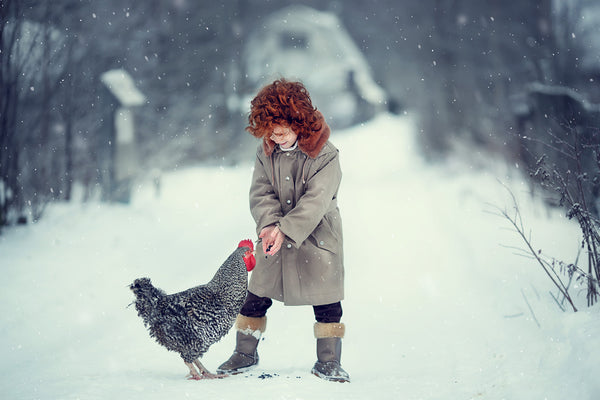
Do Chickens Lay Eggs in the Winter?
When you got into the chicken "business," there's a good chance that one of your main goals was to have a regular supply of fresh eggs in the kitchen—eggs for baking, breakfast, and snacks. And your hens have most likely kept their end of the bargain. As winter approaches, you may begin to wonder, “Do chickens lay eggs in the winter?"

Let there be light . . . and eggs
As we all know, summer days are longer than winter ones, with more hours of sunlight. In the northern hemisphere, maximum hours of sunlight peak around June 21 with minimum sunlight hours around December 21.1 You probably don't pay much attention to the lengthening and shortening of the days as you go about your daily business. It happens at such a slow rate the difference often goes unnoticed—but not to your hens! They keep an eye on these things and adjust their egg production accordingly. Chickens reach the peak of their egg-laying schedule when there's the most daylight—so summer is naturally their best season.
As winter approaches and hours of daylight diminish, so do the number of eggs your hens lay. At some point during the winter, it's possible your hens will stop laying eggs altogether for a while. They will sometimes utilize that “resting" interval as a period to molt and regrow new feathers. Molting requires quite a bit of energy, so it's challenging for a hen's body to multitask and regrow feathers while maintaining full egg production.2
Why it happens
Are the hens actively watching and paying attention to how many minutes the sun shines every day? Not really. It's something their bodies do naturally and automatically, kind of like breathing. The idea is that baby chicks need to hatch during warm weather. Hens will start egg production when there are at least 14 hours of daylight per day, and slow down egg production when daylight decreases.3
Improving your chances
So, do chickens lay eggs year round? The short answer is no. The long answer? Maybe. First of all, you're hardly the first chicken keeper to wander down this road. Chicken breeders have been selecting specific traits that make good egg layers for years and years. If you start with a breed that is already an ambitious egg-layer, your odds of having fresh eggs throughout the winter (or most of it) improve.
Some serious chicken keepers add artificial lighting to their coops to prompt the hens to keep laying eggs as long as possible in the autumn or to jump-start summer egg production more quickly. Other chicken owners prefer to take a more natural approach to the situation, enjoying eggs while they can during the summer and realizing there may be downtime during the winter—a rest period for the chickens.4 If you're debating whether or not to use artificial lighting for your hens, it's best to do further research on the subject to determine what is right for your hens, your particular breed, and your regional location.
Winter chicken keeping
If you live in a region that experiences cold weather, you'll have the challenge of caring for your birds during the winter. Consider heated waterers, heated resting pads, and even heated perches to keep your chickens comfortable.
While there are some things you can do to help keep egg production going all year round, it's perfectly normal for hens to slow down or stop laying eggs during the winter months. Before you know it, spring will arrive, and with it, longer days and a return to laying eggs.
1. Greenwich Mean Time. “The Longest Day, The Summer Solstice in the Northern Hemisphere," https://greenwichmeantime.com/longest-day/
2. Langlois, Cherie. Hobby Farms. “Molting: Know Its Causes & Help Your Flock," 4 September 2019, https://www.hobbyfarms.com/molting-chickens-causes-help/
3. Ockert, Katie. MSU Poultry Extension. “Decreasing daylight and its effect on laying hens," https://www.canr.msu.edu/news/decreasing-daylight-and-its-effect-on-laying-hens
4. Arcuri, Lauren. The Spruce Pets. “Lighting up Your Chicken Coop," 3 June 2019, https://www.thespruce.com/light-in-the-chicken-coop-3016562
